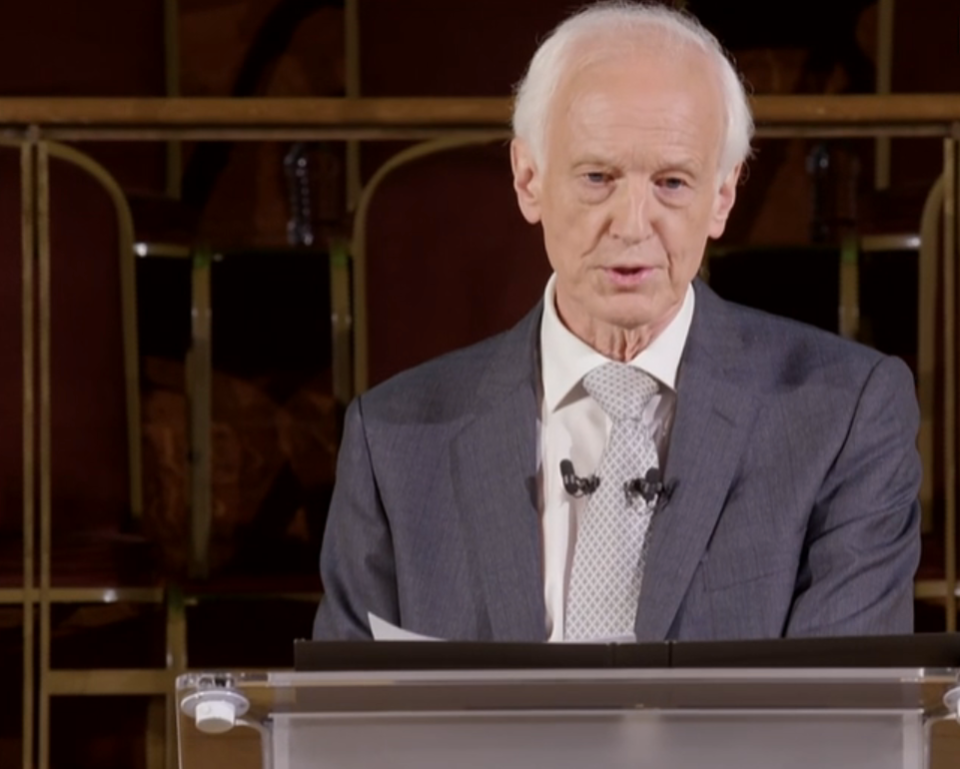Infected blood inquiry scandal - live: Sunak calls report ‘day of shame’ and vows to give victims compensation
- Oops!Something went wrong.Please try again later.
The prime minister has called the findings of the inquiry into the infected blood scandal a “day of national shame”, as he pledged to give victims compensation and apologised to them on behalf of successive governments.
Addressing the House of Commons on Monday following the publication of the damning 2,527-page report, Rishi Sunak said: “I want to make a whole-hearted and unequivocal apology for this terrible injustice.”
He also promised to pay “comprehensive compensation” to those affected and infected by the scandal. “Whatever it costs to deliver this scheme, we will pay it,” he added, saying details would be set out on Tuesday.
Politicians, doctors and civil servants were found guilty of a chilling cover-up in the report, which laid bare a catalogue of failures by successive governments and the NHS that amounted to a “calamity”.
Tens of thousands of people were avoidably infected with HIV and Hepatitis in the worst treatment disaster in the history of the NHS, which led to the deaths of around 3,000 patients.
The report into the shameful scandal found the public was falsely reassured, children were treated unnecessarily, evidence was deliberately destroyed, and a significant number of people remain undiagnosed after receiving blood transfusions in the 1970s, 80s and 90s.
Some patients were “betrayed” because tests were carried out on them without their knowledge or consent.
John Glen, the Cabinet Office minister dealing with the scandal on behalf of the government, has refused to rule out criminal proceedings for those involved.
Key Points
Rishi Sunak vows victims will receive compensation: ‘Whatever it costs, we will pay it'
Rishi Sunak calls damning revelations of report ‘a day of shame for the British state’
Prime minister ‘wholeheartedly and unequivacally’ apologises to infected blood victims
Sir Keir Starmer apologises to victims of infected blood scandal for injustice on ‘unprecedented scale'
Deaths and suffering of tens of thousands ‘could and should have been avoided’
07:39 , Sam Rkaina
We’re pausing our live coverage of the blood inquiry but keep checking independent.co.uk for the latest updates.
Treloar’s pupils treated with contaminated blood regarded as ‘objects for research’
Monday 20 May 2024 23:00 , Tara Cobham
Pupils at a school were regarded “as objects for research” when they were treated with multiple, risky contaminated blood products, a damning inquiry into the infected blood scandal has found.
Between 1970 and 1987, 122 young boys who were pupil’s at Lord Mayor Treolar College were infected with HIV and Hepatitis C through contaminated products - only 30 of these pupils are alive. Research was conducted on pupils, who were subsequently infected.
The inquiry found in its report there is “no doubt that the risks of viruses, in particular hepatitis being transmitted through blood or blood products were well known to Treloar’s clinicians…clinical staff were well aware that their heavy use of commercial concentrate risked causes AIDS.”
Government’s sluggish work on redress perpetuated harm to blood victims – report
Monday 20 May 2024 22:00 , Tara Cobham
Rishi Sunak’s Government has compounded the suffering of victims of the infected blood scandal with the “sluggish pace” and lack of transparency on compensation, an inquiry into the disaster in the NHS has found.
The Prime Minister’s insistence on waiting for the conclusion of the Infected Blood Inquiry before making a final decision on redress has “perpetuated the injustice for victims”, its chairman, Sir Brian Langstaff, said in his final report.
He criticised the “litany of failures” by successive governments from the early 1970s, with no action taken even as it became known that the collection of blood from prisons led to an increased risk of hepatitis transmission.
Sophie Wingate reports:
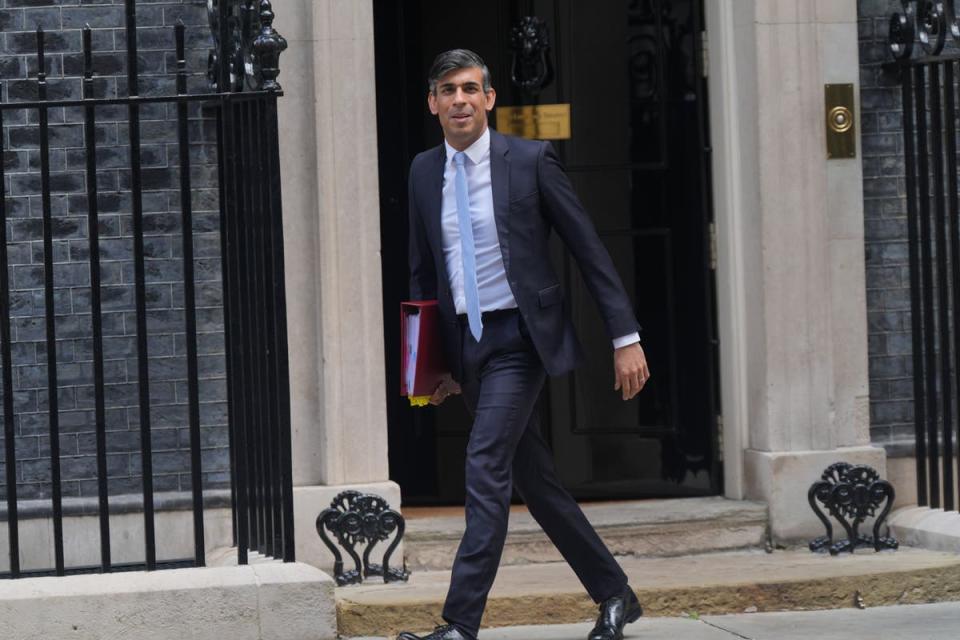
Government’s sluggish work on redress perpetuated harm to blood victims – report
Infected blood inquiry chair urges government to compensate victims
Monday 20 May 2024 21:00 , Tara Cobham

Infected blood inquiry chair urges government to compensate victims
The shocking numbers behind the infected blood scandal
Monday 20 May 2024 20:00 , Tara Cobham
The worst treatment disaster in the history of the NHS has been exposed in a damning public inquiry.
A 2,527-page report into the “shameful” infected blood scandal has accused the government and NHS of a calamity of failures that left 30,000 patients infected with HIV and hepatitis.
More than 3,000 people have died due to infected blood, blood products and tissue, with the number continuing to rise.
Jabed Ahmed reports:
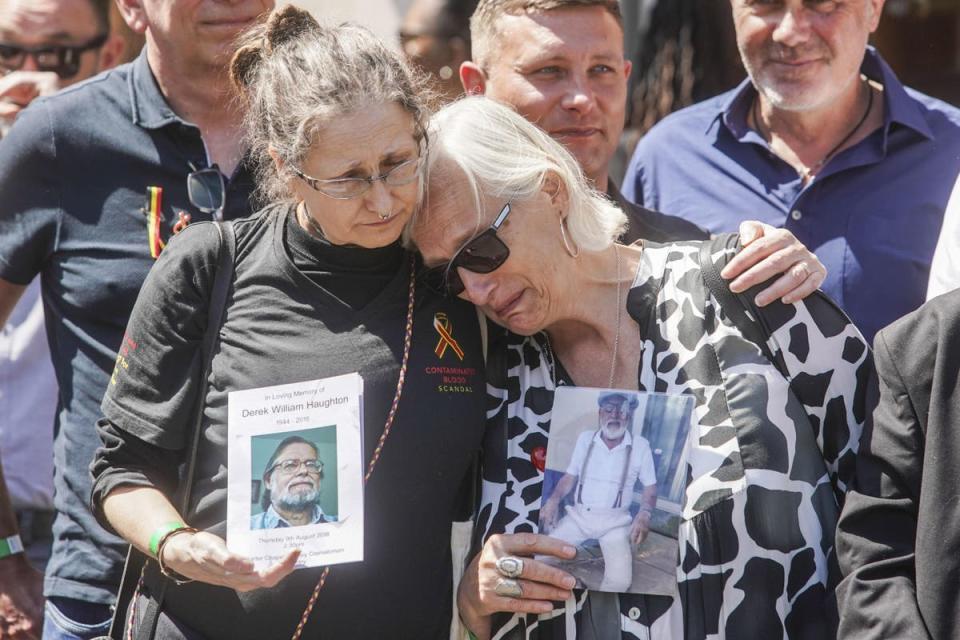
30,000 infected and 3,000 dead: The shocking numbers behind infected blood scandal
NHS chief issues an apology to infected blood victims
Monday 20 May 2024 19:01 , Barney Davis
NHS England chief executive Amanda Pritchard has issued an apology to victims of the infected blood scandal on behalf of the health service in England.
She said in a statement: “Earlier today, the Infected Blood Inquiry published its final report. The Prime Minister has subsequently issued an apology on behalf of successive Governments and the entire British state. I want to do the same on behalf of the NHS in England now, and over previous decades. Today’s report brings to an end a long fight for answers and understanding that those people who were infected and their families, should never have had to face.
“We owe it to all those affected by this scandal, and to the thorough work of the Inquiry team and those who have contributed, to take the necessary time now to fully understand the report’s conclusions and recommendations. However, what is already very clear is that tens of thousands of people put their trust in the care they got from the NHS over many years, and they were badly let down.
“I therefore offer my deepest and heartfelt apologies for the role the NHS played in the suffering and the loss of all those infected and affected.
“In particular, I want to say sorry not just for the actions which led to life-altering and life-limiting illness, but also for the failures to clearly communicate, investigate and mitigate risks to patients from transfusions and treatments; for a collective lack of openness and willingness to listen, that denied patients and families the answers and support they needed; and for the stigma that many experienced in the health service when they most needed support.
“I also want to recognise the pain that some of our staff will have experienced when it became clear that the blood products many of them used in good faith may have harmed people they cared for.
“I know that the apologies I can offer now do not begin to do justice to the scale of personal tragedy set out in this report, but we are committed to demonstrating this in our actions as we respond to its recommendations.”
‘Poor record keeping; contributed to contaminated blood disaster, says Sir Brian
Monday 20 May 2024 19:00 , Tara Cobham
“Poor record keeping” contributed to the contaminated blood disaster, Sir Brian Langstaff said.
The inquiry chairman said: “Poor record keeping has been a problem across many of the issues examined by the Inquiry.
“This had an impact on safety. If you can’t trace the source of a transfusion back to the donor who was infected, you cannot then tell and treat the donor, and avoid any further donations from that source. Nor can you trace previous donations to check if other people who have had transfusions from the same source have become ill.
“And reporting of infections did not have the priority it should have done.”
Politicians pledge to end ‘institutional defensiveness’
Monday 20 May 2024 18:04 , Tara Cobham
Former health secretary Sir Sajid Javid said the infected blood scandal is “the biggest in the history of the NHS” and accused public servants of “putting the reputation of themselves, and the NHS above that of patient safety and care”.
He added: “Time and time again ministers have stood at that despatch box, under successive governments including myself, promising that lessons will be learned. So can I ask (Rishi Sunak) why will it be any different this time?”
He referenced inquiries into other major scandals including the Shrewsbury maternity scandal.
Prime Minister Rishi Sunak said the government must “fundamentally rebalance the system” to finally address the failures which happened and are “so familiar from other inquiry by Hillsborough when innocent victims have to fight for decades”.
Sir Keir Starmer said: “The institutional defensiveness identified by Sir Brian is a pattern of behavior that we must reverse.”
Cover-up of infected blood scandal was ‘subtle, pervasive and chilling’ – report
Monday 20 May 2024 18:00 , Tara Cobham
There was a “subtle, pervasive and chilling” cover-up of the infected blood scandal, according to the final report from the long-running inquiry.
Tens of thousands of people in the UK were infected with deadly viruses after they were given contaminated blood and blood products between the 1970s and early 1990s.
The final report of the Infected Blood Inquiry, published on Monday, found there has been “deliberate destruction” of relevant documents and “elements of downright deception” from those in positions of trust and power.
Ellie Ng reports:

Cover-up of infected blood scandal was ‘subtle, pervasive and chilling’ – report
‘Layer upon layer of hurt’ caused by government and NHS failures, PM admits
Monday 20 May 2024 17:53 , Rebecca Thomas
In his apology the Prime Minister Rishi Sunak admitted,“It did not have to be this way. It should never have been this way.”
“And on behalf of this and every government stretching back to the 1970s, I am truly sorry.”
He said: “Layer and layer upon hurt, endured across decades, this is an apology from the state to every single person impacted by the scandal.”
‘Result of this inquiry should shake our nation to its core’, PM tells parliament
Monday 20 May 2024 17:44 , Tara Cobham
The results of the infected blood inquiry should “shake our nation to its core”, Prime Minister Rishi Sunak said opening his apology made in the House of Commons on Monday.
He continued: “At every level, the institutions and people in which we put our trust have failed in the most devastating way.”
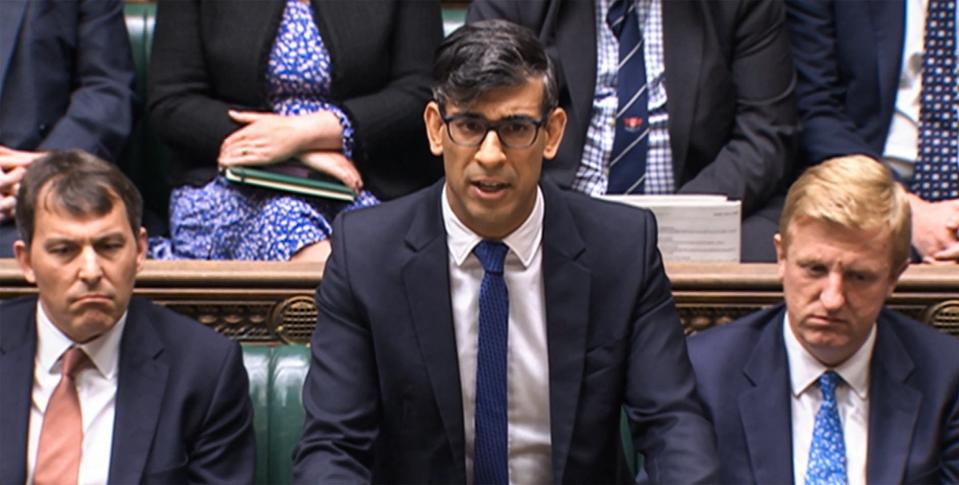
Sir Keir Starmer apologises to victims of infected blood scandal for injustice on ‘unprecedented scale'
Monday 20 May 2024 17:35 , Tara Cobham
Sir Keir Starmer has apologised to victims of the infected blood scandal for the injustice they have faced on an “unprecedented” scale.
Addressing the victims when speaking in the House of Commons on Monday, he said: “Politics itself failed you - that failure applies to all parties including my own. There is only one word: ‘Sorry’.”
Rishi Sunak vows victims will receive compensation: ‘Whatever it costs, we will pay it'
Monday 20 May 2024 17:32 , Rebecca Thomas
Rishi Sunak has vowed victims of the infected blood scandal will receive compensation.
The prime minster pledged: “Whatever it costs to deliver this scheme, we will pay it.”
Around £10 billion has been earmarked for a compensation package for those affected, which is set to be announced on Tuesday.
Prime minister ‘wholeheartedly and unequivacally’ apologises to infected blood victims
Monday 20 May 2024 17:27 , Tara Cobham
The prime minister has “wholeheartedly and unequivocally apologised to the victims of the infected blood scandal.
Speaking in the House of Commons on Monday, Rishi Sunak said: “Today I want to speak directly to the victims and their families, some of whom are with us in the gallery - I want to make a wholehearted and unequivocal apology for this terrible injustice.”
Rishi Sunak calls damning revelations of report ‘a day of shame for the British state’
Monday 20 May 2024 17:22 , Tara Cobham
Rishi Sunak has called the damning revelations of the inquiry into the infected blood scandal “a day of shame for the British state”.
Addressing the House of Commons on Monday in the wake of the publishing of the inquiry’s findings, the prime minister said: “This is a day of shame for the British state. Today’s reprot shows decades-long national failure at the heart of our national life.”
Watch live: Rishi Sunak makes statement on infected blood scandal after damning report released
Monday 20 May 2024 17:20 , Tara Cobham

Infected blood scandal: Sunak makes statement on after damning inquiry report
Rishi Sunak set to give statement in parliament over infected blood scandal
Monday 20 May 2024 16:54 , Tara Cobham
Rishi Sunak is set to give a statement in parliament over the infected blood scandal.
The prime minister is expected to apologise as he addresses the House of Commons at 5pm today, said the chair of the damning inquiry, Sir Brian Langstaff.
Watch: Politicians ‘should hang their heads in shame’ over scandal, says campaigner
Monday 20 May 2024 16:22 , Tara Cobham
‘Villains’ of the infected blood scandal exposed
Monday 20 May 2024 16:21 , Tara Cobham
Former health secretary Lord Kenneth Clarke has been exposed as one of multiple “villains” complicit in the failures identified by the infected blood inquiry today.
Lord Ken Clarke was health minister between 1982 and 1985 when the government was warned about using blood products from prisons in the US by a leading epidemiologist.
Margaret Thatcher, it was found, was key in the peddling of the false argument that people infected with HIV from blood products “had been given the best treatment available on the then current medical advice, and without it many of the haemophiliacs would have died”, according to the inquiry.
On 22 November 1989, the former prime minister rebuffed a proposal by an MP that the government should take special action on moral and political grounds.
Multiple ministers have opposed compensation during the decades-long fight, including Stephen Dorrell, minister for health between 1995 and 1997, and Alan Milburn who was Secretary of State for Health, from 1999 to 2003.
Rishi Sunak’s, who is expected to make an announcement at 5pm today, compounded the suffering of the victims, the inquiry said, with the “sluggish pace” and lack of transparency on compensation.
One of the most shocking stories within the scandal was the infection of 122 young boys who were “experimented” Dr Anthony Aronstam, who has since died.
Another clinician professor Arthur Bloom, who has also since died, was the director of the Cardiff Haemophilia Centre, and considered one of the UK’s leading haematologists during the 1970s and 80s, “overly influenced” the way the government view the emergence of aids and played down the threat posed to people.
Watch: Infected blood inquiry chair urges government to compensate victims
Monday 20 May 2024 15:54 , Tara Cobham
Sir Brian vows to prevent ‘unreasonable delay’ in government response to his report
Monday 20 May 2024 15:34 , Tara Cobham
Sir Brian Langstaff vowed to “do what I properly can within my powers” to prevent “unreasonable delay” in the Government response to his report.
The chairman of the probe said: “In the context of this Inquiry, perhaps beyond all other, it is unconscionable to allow a state of affairs to exist in which people’s fears that the lessons and recommendations of this Inquiry will collect dust on a Cabinet Office shelf are realised…
“It is for the Government to respond as it will, but I intend to use my position as far as I properly can to prevent unreasonable delay in its doing so.”
Sir Brian concluded his statement by saying: “It may be late, but it is not too late: now is the time, finally, for national recognition of this disaster, for proper compensation and for vindication for all those have been so terribly wronged.”
Those who remained silent should be blamed for scandal, says chair
Monday 20 May 2024 15:23 , Holly Evans
Those responsible in the infected blood disaster should be blamed for keeping silent, Sir Brian Langstaff said as he listed his recommendations.
Where an individual is responsible for something going wrong “they should certainly be blamed if they keep silent” and be obliged to report “near misses” as well as actual wrongs, the inquiry chairman said.
Leaders in healthcare should be made subject to a statutory duty of candour, the regulatory landscape for patient safety should be “decluttered”, and the NHS should establish a safety management system, he also said.
‘Infected blood scandal left me orphaned at 9 - it tore my family apart’
Monday 20 May 2024 15:19 , Holly Evans
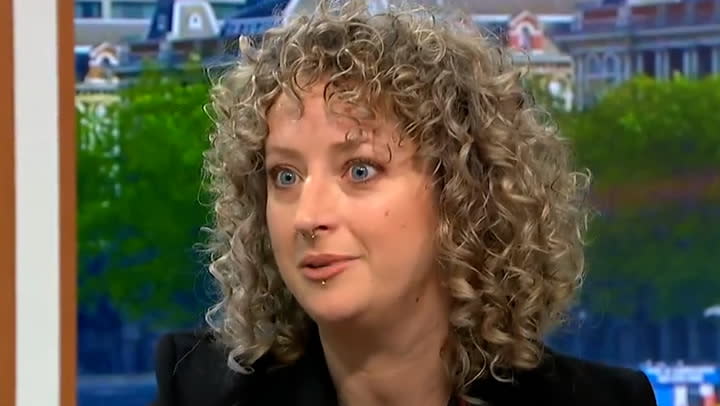
‘Infected blood scandal left me orphaned at 9 - it tore my family apart’
Inquiry chair repeats calls for compensation for infected blood victims
Monday 20 May 2024 15:17 , Sian Elvin
The Infected Blood Inquiry chair has repeated calls for compensation for victims of the scandal.
To a round of applause from an audience at Central Hall Westminster, Sir Brian Langstaff said: “Now is the time, finally, for national recognition of this disaster, for compensation… for all those who have been so terribly wronged.”
Chancellor Jeremy Hunt on Sunday pledged to announced a compensation package worth more than £10 billion for victims.
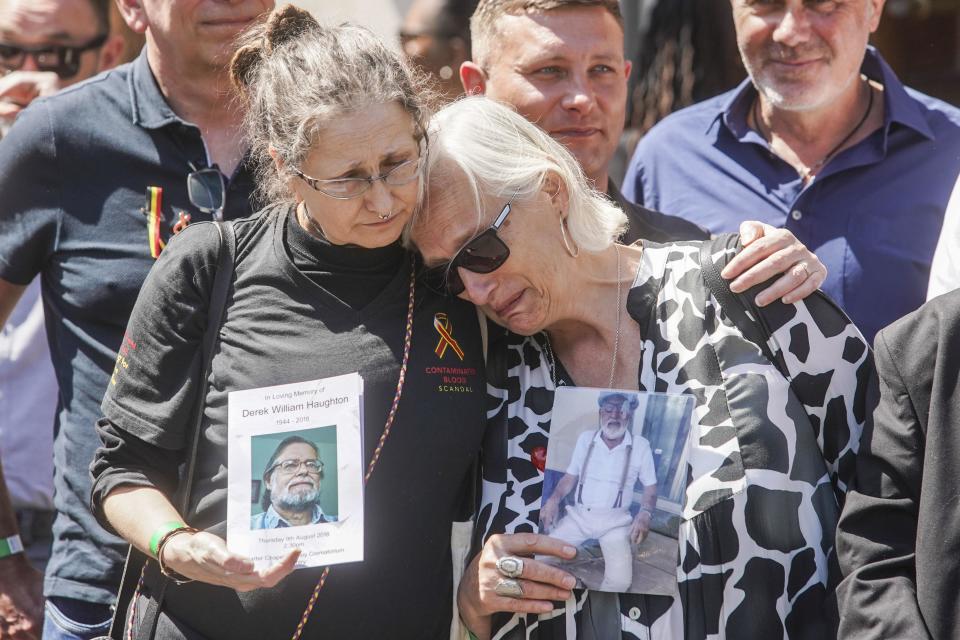
Inquiry Chair demands government apologise to contaminated blood victims
Monday 20 May 2024 15:12 , Holly Evans
The chair of the Infected Blood Inquiry has called on the government to apologise to victims of the contaminated blood scandal.
Speaking on stage at Central Hall Westminster to an audience of victims, he was applauded as he said: “I fully expect the government to make an apology.
“To be meaningful though that apology must explain what the apology is for. It should recognise and acknowledge not just the suffering but the fact that the suffering was due to errors, wrongs done and delays occurred. It should provide vindication for those who have waited for that for so long. And it should be accompanied by action.”
Prime Minister Rishi Sunak is expected to apologise on behalf of the government in a statement given at 5pm today.
‘Unethical and wrong’ that children’s treatment was not explained to parents
Monday 20 May 2024 15:10 , Holly Evans
Sir Brian Langstaff said it was “unconscionable” that children at the Treloar’s school were treated in a way that “trumped safety” without the risks being explained to their parents.
He said: “Treatment choices mattered. Take the case of the haemophilia centre at Treloar’s school. Of the 122 pupils with haemophilia who attended the school between 1970 and 1987 only 30 survive.
“The pupils were often regarded as objects for research rather than first and foremost as children whose treatment should be firmly focused on their individual best interests alone.”
He added that it was “unethical and wrong” that informed consent for participation in medical trials was neither sought nor given.

Colleague of chairman of the haemophilia directors believed to be whistleblower
Monday 20 May 2024 15:03 , Holly Evans
A colleague of Professor Arthur Bloom, who was chairman of the haemophilia directors, is thought to be a whistleblower on the infected blood scandal, according to the Inquiry chairman.
Sir Brian Langstaff said Prof Bloom, who died many years ago, “must bear some of the responsibility for the UK’s slowness in responding to the risks of Aids to people with haemophilia”.
He said the Inquiry believes one of the sources for a 1983 Mail on Sunday story headlined “Hospitals using killer blood” was “Professor Bloom’s respected senior colleague in Cardiff, who was reluctant at the time to be identified as a whistleblower”.
Prof Bloom at the time said he was unaware of any proven case in the UK and there was no need to change their treatment, Sir Brian said, adding that “disastrously the Department of Health and Social Security was over-influenced by his advice, in particular his advice to continue importing commercial factor concentrates”.
Patient’s ‘trauma compounded by lack of recognition and accountability’, says inquiry chair
Monday 20 May 2024 15:00 , Holly Evans
Patients who were infected with contaminated blood have had their “trauma compounded by the lack of recognition of what happened to them and by a lack of accountability”, the Infected Blood Inquiry chair has said.
Sir Brian Langstaff listed three claims that have continuously been posited by authorities in response to victims’ calls for justice - that patients had the best available treatment, that infections were inadvertent, and that screening for Hepatitis C could not have been introduced earlier than September 1991.
He then refuted them all as “untrue” to a round of applause from the Central Hall Westminster audience.
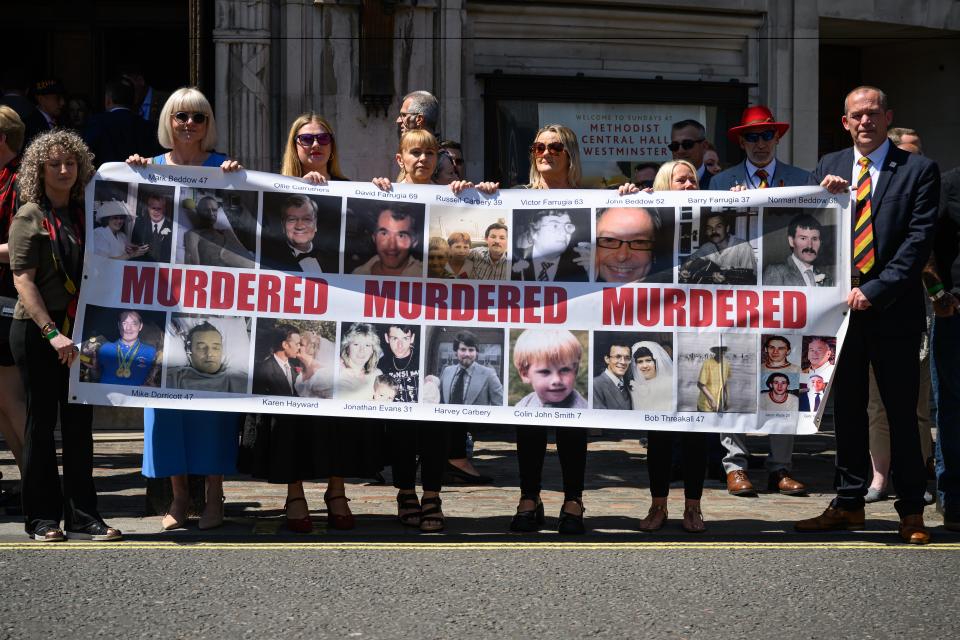
Government’s reaction to Aids connection to blood products was ‘slow'
Monday 20 May 2024 14:53 , Holly Evans
The Government was “unconscionably slow” in reacting to emerging knowledge that blood products could lead to Aids, Sir Brian Langstaff said.
He said: “A real risk that blood products transmitted the cause of Aids was known by Government by July 1982; by all haemophilia doctors by the end of 1982.
“There was already a growing epidemic in the US likely to come to these shores. Yet the response was one of denial, disbelief, dismissiveness and delay.
“The Government’s response was unconscionably slow. So too was the response of haemophilia centre directors, and of their organisation, the UKHCDO.”
Government ‘wrong’ for saying screening tests introduced as soon as technolology available
Monday 20 May 2024 14:43 , Athena Stavrou
Government claims in the 1990s that screening tests for HIV and hepatitis C were introduced as soon as the technology was available were “wrong,” Sir Brian Langstaff said.
“In the case of HIV, a test had been developed by August 1984 but was not introduced for the screening of blood donations until October 1985,” the Infected Blood Inquiry chairman said.
“I have concluded that we lost months, for no clear reason, by delays and indecision when setting up a process to evaluate each available make of test. Yet a number were commercially available, and being used elsewhere in the world. Patients receiving transfusions in the UK were needlessly exposed to the risk of HIV as a result.
“In the case of Hepatitis C the delays were even worse: screening of blood donations was not introduced until September 1991. Even when a screening test was available, and approved, its use had to wait till all regions could introduce it on the same date – in other words, to go at the pace of the slowest.
“When the government claimed that screening for Hepatitis C had been introduced as soon as the technology became available, they ignored the long list of countries that introduced screening before the UK.”
Sir Brian went on to list 23 countries where screening was available before the UK.
Treloar’s pupils treated with contaminated blood regarded as ‘objects for research’
Monday 20 May 2024 14:41 , Athena Stavrou
Pupils at a school were regarded “as objects for research” when they were treated with multiple, risky contaminated blood products.
Sir Brian Langstaff has highlighted the plight of the children who attended Treloar’s boarding school as he spoke on stage in the wake of the publication of the Infected Blood Inquiry’s damning report.
Between 1970 and 1987, 122 young boys who were pupil’s at Lord Mayor Treolar College were infected with HIV and Hepatitis C through contaminated products - only 30 of these pupils are alive. Research was conducted on pupils, who were subsequently infected.
The inquiry found in its report there is “no doubt that the risks of viruses, in particular hepatitis being transmitted through blood or blood products were well known to Treloar’s clinicians…clinical staff were well aware that their heavy use of commercial concentrate risked causes AIDS.”
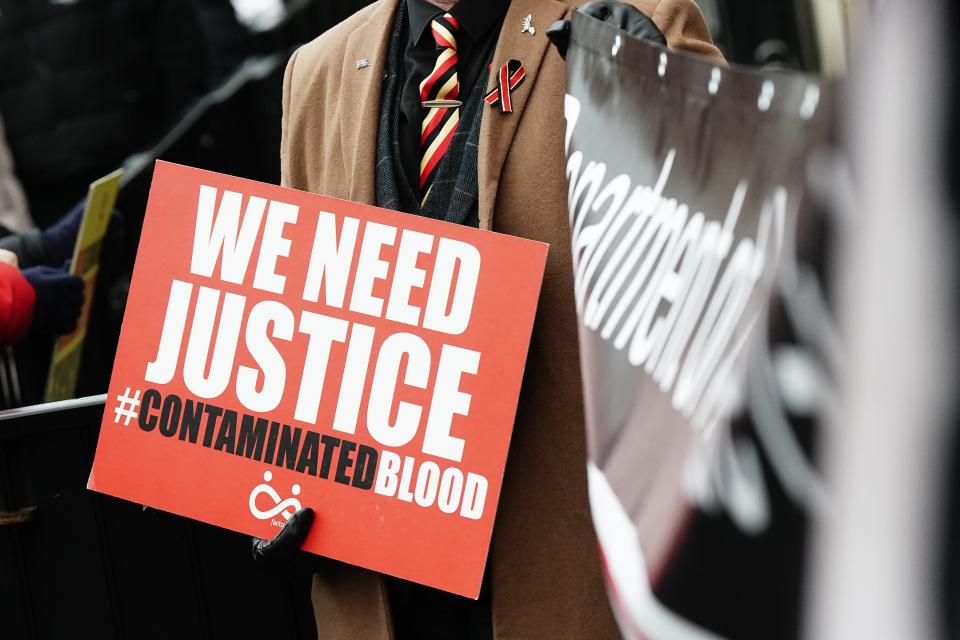
Inquiry says compensation scheme must be set up “now” for tens of thousands harmed by infected blood
Monday 20 May 2024 14:40 , Rebecca Thomas
First in a suite of recommendations from infected blood inquiry chair Sir Brian Langstaff is for the government to set up a compensation scheme for victims.
Ministers have earmarked around £10 billion for a compensation package for those affected, which is expected to be announced on Tuesday or Wednesday.
In shocking revelations the inquiry has suggested there are potentially hundreds of undiagnosed individuals who have been unknowingly infected. It has recommended doctors should offer all patients who had blood transfusions before 1996 a blood test for Hepatitis C.
The inquiry told the government it should commit to implementing its 12 recommendations, within which there are more than 50 actions, in the next 12 months or give sufficient reasons got why it cannot.
The report also said the government’s Public Administration and Constitutional Affairs Committee should be able to review any future refusal by ministers to bring about a statutory public inquiry and that it should review the government’s timetable for inquiry implementing recommendations.
Other recommendations from the inquiry include stricter requirements on health officials to be held accountable for cultures of “defensiveness” and a “lack of openness” in their organisations.
Patients ‘needlessly exposed’ to infections for months ‘for no clear reason’, concludes Sir Brian
Monday 20 May 2024 14:39 , Athena Stavrou
The inquiry chair has concluded patients were “needlessly being exposed” to infections for months “for no clear reason”.
The introduction of a universal screening test for HIV in October 1985 came a year and a half after the virus was identified due to “delays and indecisions”, Sir Brian Langstaff told an audience at Central Hall Westminster.
He said the screening for Hepatitis C was not introduced until as late as September 1991.
He went on to highlight how government and doctors knew AIDS could be transferred via blood products in 1982, yet people were being given contaminated blood into the 1990s.
He described the government’s response as “unconscionably slow”.
Blood donors should have been better selected, Langstaff says
Monday 20 May 2024 14:36 , Athena Stavrou
Sir Brian Langstaff said that blood donors should have been better selected.
“The blood used for transfusions and to make blood products in the UK was from British donors, who could and should have been better selected,” he said.
“For instance, in 1975 the chief medical officer for England said the practice of collecting blood in prisons could continue even though prisoners were known to have higher numbers of hepatitis infections – and this practice was not ended in the UK until 1984; no real efforts were made to prevent those who had used intravenous drugs – and who were therefore a higher risk of hepatitis – from donating blood; and the steps taken to keep donors who were more likely to be incubating Aids out of the donation chain were late in starting, and when they finally began were inadequate.”
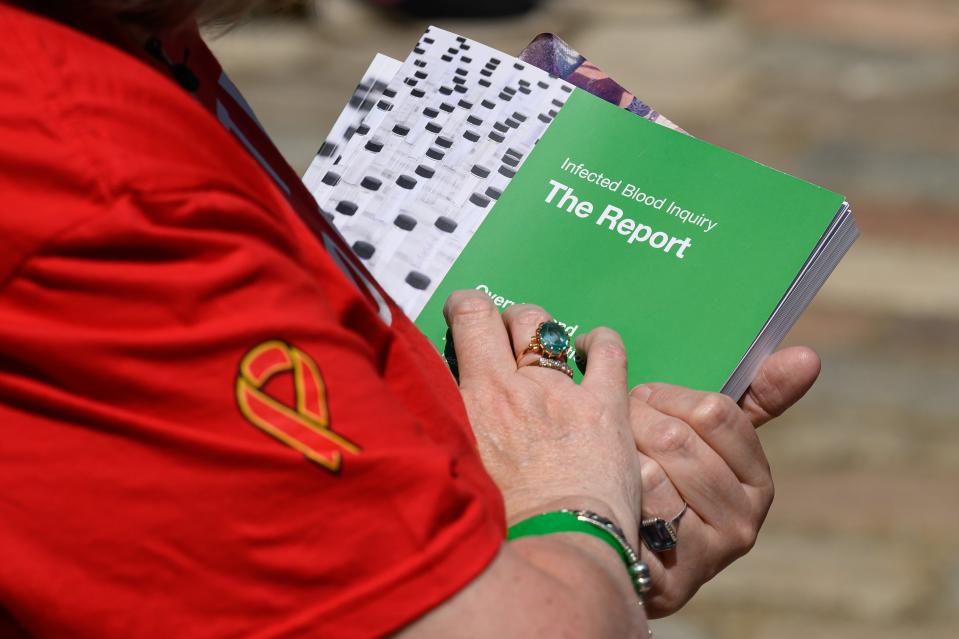
On the process of pooling blood plasma donations together, he added: “The use of only small pools lasted until after 1970. Then, however, something extraordinary happened. Just as the long term seriousness of hepatitis became more and more apparent, the size of the pools used to make UK blood products grew ever larger and larger, and with that so too did the risks. Instead of reducing the risk, the UK was steadily increasing it.”
Meanwhile he said the UK was “wrong” to licence blood plasma products from the US in the 1970s, where donors were paid for their donations.
“The licensing authority knew too that these products were made from very large pools,” he said.
“The risks of hepatitis were freely admitted by the makers. I have concluded the UK was wrong to decide to license these products in 1973, and later decisions in the 1970s to grant further licences for similar US products were also wrong. These products should simply not have been permitted to be distributed generally in this country.”
Health leaders ‘did not put patient safety first'
Monday 20 May 2024 14:26 , Athena Stavrou
Infected Blood Inquiry chairman Sir Brian Langstaff has said that health leaders “did not put patient safety first”.
He said in a statement made to victims and their loved ones: “Tragically, the infections happened because those in authority – doctors, the blood services and successive governments – did not put patient safety first.
“They lost sight of what was known about the risks of viral infections from blood. ‘Doctor knows best’ was such a strong belief that health departments did not issue guidance to curb the unsafe use of blood and blood products.
“Decision-making on measures that could make blood and blood products safer was put off, then dragged out unnecessarily, and failed to reach clear and decisive conclusions.
“And patients were simply not given the information they needed to make fully informed decisions about their own treatment.”
Successive governments compounded suffering
Monday 20 May 2024 14:22 , Athena Stavrou
Successive governments and the health service compounded victims’ suffering, Infected Blood Inquiry chairman Sir Brian Langstaff said.
In his statement, the former high court judge said: “The NHS and successive governments compounded the agony by refusing to accept that wrong had been done.
“More than that, the Government repeatedly maintained that people received the best available treatment and that testing of blood donations began as soon as the technology was available. And both claims were untrue.”
Sir Brian said the inquiry’s mission to prevent similar scandals is not only about “taking steps to meet any threat of a future infection carried by blood, blood products or tissue, but to ensure as far as we can that Government responds to the citizens it serves, how shall I put this, more appropriately”.
‘Every aspect’ of victim’s lives affected
Monday 20 May 2024 14:19 , Athena Stavrou
Sir Brian Langstaff said that infections have impacted “every aspect” of the lives of the affected.
“Early on, in particular, they had to do so whilst being shunned, or worse, abused, by neighbours, workmates, by people they had once thought of as friends. Sometimes by health professionals.
“The Inquiry is not just investigating something which happened years ago. It is still happening.
“People still have to care for the after-effects of what happened which their loved ones still suffer. The grief and trauma which all of those who lost loved ones experienced continues to this day.
“The early treatments for HIV and Hepatitis C, were often worse than the illnesses themselves; the side-effects linger, and for a number of those infected with Hepatitis C the damage done over so many years to their liver has left them at risk of developing cancer and requiring liver transplants.
“Every aspect of their lives has been defined by their infections – childhood; education; career; leisure; relationships; marriages; home-ownership; travel; finances; dreams and ambitions have been lost and relationships broken.”
People put their faith in government to keep them safe - and their trust was betrayed’
Monday 20 May 2024 14:17 , Athena Stavrou
The chair of the Infected Blood Inquiry has said the trust victims put in governments to keep them safe was “betrayed”.
Speaking at Central Hall Westminster after the publication of the damning report into the scandal, Sir Brian Langstaff said: “People put their faith in government to keep them safe - and their trust was betrayed.
“The NHS and successive governments compounded the agony by refusing to accept that wrongs had been done.”
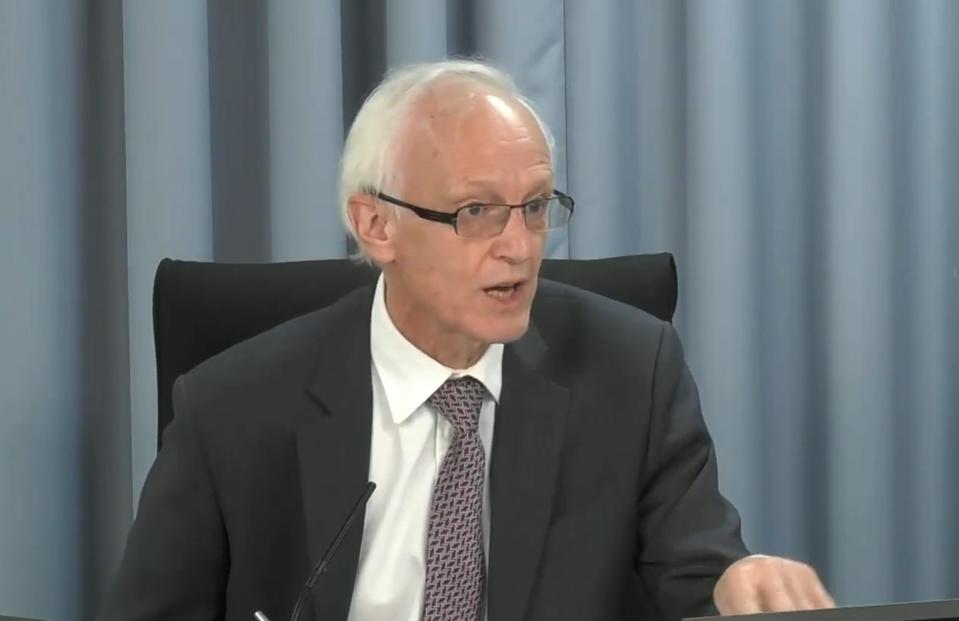
Harm done to people cannot adequately be put into words, says inquiry chair
Monday 20 May 2024 14:15 , Athena Stavrou
Sir Brian Langstaff has been welcomed to the stage at Central Hall Westminster by a long round of applause.
The chair of the Infected Blood Inquiry told the central London audience upon the publication of the inquiry’s damning report: “The harm that was done to people cannot adequately be put into words.”
He called the infection of tens of thousands of people with “life-changing” viruses a “horror”, as the number of people dying on top of the 3,000 who have already died in the scandal continues to climb “week-by-week”.

Monday 20 May 2024 14:14 , Athena Stavrou
Speaking to an audience at Central Hall in Westminister, the chair of the infected blood inquiry said “dreams and ambitions” of victims “have been lost”.
Sir Brian Langstaff said: “It really takes a person who has lived and is living with them to describe them in a way which brings home the horror that has happened.
He added: “People put their faith in doctors and in the government to keep them safe and their trust was betrayed.”
Infected blood inquiry chair speaking on finding
Monday 20 May 2024 14:07 , Athena Stavrou
The chair of the infected blood inquiry is currently delivering a speech on the findings of the report.
Sir Brian Langstaff began his speech by inviting the audience to give a wide round of applause to all those involved in the report.
